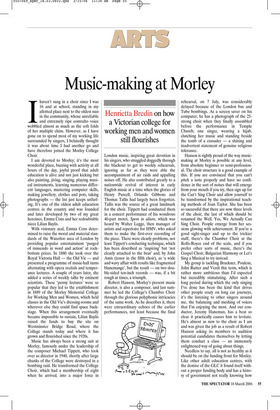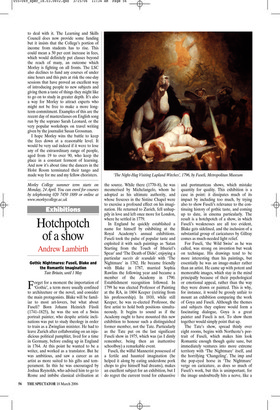Music-making at Morley
Henrietta Bredin on how a Victorian college for working men and women still flourishes
Ihaven’t sung in a choir since I was 16 and at school, standing in my allotted place next to the oldest nun in the community, whose unreliable and extremely ripe contralto voice wobbled almost as much as the soft folds of her multiple chins. However, as I have gone on to spend most of my working life surrounded by singers, I belatedly thought it was about time I had another go and have therefore joined the Morley College Choir.
I am devoted to Morley; it’s the most wonderful place, buzzing with activity at all hours of the day, joyful proof that adult education is alive and not just kicking but also painting, jiving, singing, playing musical instruments, learning numerous different languages, mastering computer skills, making jewellery, clothes and pots, taking photographs — the list just keeps unfurling. It’s one of the oldest adult education centres in the country and was founded and later developed by two of my great heroines, Emma Cons and her redoubtable niece Lilian Baylis.
With visionary zeal, Emma Cons determined to raise the moral and material standards of the Waterloo area of London by providing popular entertainment ‘purged of innuendo in word and action’ at rockbottom prices. In 1880 she took over the Royal Victoria Hall — the Old Vic — and presented a programme of music-hall turns alternating with opera recitals and temperance lectures. A couple of years later, she added a series of weekly talks by eminent scientists. These ‘penny lectures’ were so popular that they led to the establishment in 1889 of the Morley Memorial College for Working Men and Women, which held classes in the Old Vic’s dressing-rooms and wherever else they could find space backstage. When this arrangement eventually became impossible to sustain, Lilian Baylis raised the funds to buy the site on Westminster Bridge Road, where the College stands today and where it has grown and flourished since the 1920s.
Music has always been a strong suit at Morley, famously under the leadership of the composer Michael Tippett, who took over as director in 1940, shortly after large chunks of the College were destroyed in a bombing raid. He transformed the College Choir, which had a membership of eight when he arrived, into a major force in London music, inspiring great devotion in his singers, who struggled doggedly through the blackout to get to weekly rehearsals, ignoring as far as they were able the accompaniment of air raids and appalling noises off. He also contributed greatly to a nationwide revival of interest in early English music at a time when the glories of Henry Purcell, Orlando Gibbons and Thomas Tallis had largely been forgotten. Tallis was the source of a great landmark for the choir. Tippett had conducted them in a concert performance of his wondrous 40-part motet, Spem in alium, which was heard by Walter Legge, then manager of artists and repertoire for HMV, who asked them to make the first-ever recording of the piece. There were clearly problems, not least Tippett’s conducting technique, which has been described as ‘inspiring’ but ‘not clearly attached to the beat’ and, by John Amis (tenor in the fifth choir), as ‘a wide and wavy affair with results like fragmented blancmange’, but the result — on two double-sided ten-inch records — was, if a bit rough at times, a triumph.
Robert Hanson, Morley’s present music director, is also a composer, and last summer he led the College’s Chamber Choir through the glorious polyphonic intricacies of the same work. As he describes it, there were extraordinary echoes of the earlier performances, not least because the final rehearsal, on 7 July, was considerably delayed because of the London bus and Tube bombings. As a screen saver on his computer, he has a photograph of the 25strong choir when they finally assembled before the performance in Temple Church; one singer, wearing a hijab, clutching her music and standing beside the tomb of a crusader — a shining and inadvertent statement of genuine religious tolerance.
Hanson is rightly proud of the way musicmaking at Morley is possible at any level, from absolute beginner to semi-professional. The choir structure is a good example of this. If you are convinced that you can’t pitch a note properly and have no confidence in the sort of noises that will emerge from your mouth if you try, then sign up for the Can’t Sing Choir and allow yourself to be transformed by the inspirational teaching methods of Joan Taylor. She has been so successful that there are now three levels of the choir, the last of which should be renamed the Well, Yes, We Actually Can Sing Choir. People emerge from her sessions glowing with achievement. If you’re a good sight-singer and up to the trickier stuff, there’s the Chamber Choir at the Rolls-Royce end of the scale, and if you prefer other sorts of music, there’s the Gospel Choir, Bulgarian Harmony or Let’s Sing a Musical to try instead.
My group is tackling Bruckner, Poulenc, John Rutter and Verdi this term, which is rather more ambitious than I’d expected but incredibly stimulating. After such a long period during which the only singing I’ve done has been the kind that drives other people crazy on long car journeys, it’s the listening to other singers around me, the balancing and meshing of voices that I’m enjoying the most. And our conductor, Jeremy Haneman, has a beat so clear it practically causes him to levitate. He’s almost as new to the choir as I am and was given the job as a result of Robert Hanson asking its members to audition potential candidates themselves by letting them conduct a class — an immensely enlightened way of going about things.
Needless to say, all is not as healthy as it should be on the funding front for Morley. Like other adult education centres, with the demise of the GLC it found itself without a proper funding body and has a history of government not really knowing how to deal with it. The Learning and Skills Council does now provide some funding but it insists that the College’s portion of income from students has to rise. This could mean a 50 per cent increase in fees, which would definitely put classes beyond the reach of many, an outcome which Morley is fighting on all fronts. The LSC also declines to fund any courses of under nine hours and this puts at risk the one-day sessions that have proved an excellent way of introducing people to new subjects and giving them a taste of things they might like to go on to study in greater depth. It’s also a way for Morley to attract experts who might not be free to make a more longterm commitment. Examples of this are the recent day of masterclasses on English song run by the soprano Sarah Leonard, or the very popular workshops on travel writing given by the journalist Susan Grossman.
I hope Morley wins the battle to keep the fees down at a reasonable level. It would be very sad indeed if it were to lose any of the extraordinary range of people, aged from 19 to over 90, who keep the place in a constant ferment of learning. And now it’s about time the dancers in the Holst Room terminated their tango and made way for me and my fellow choristers.



















































































 Previous page
Previous page